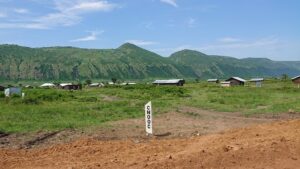Just Finance International Report Reveals Oil Fields Violations
A report from Just Finance International, released on March 25, 2024, implicated the Ugandan army in human rights violations in the fishing communities around the shore of Lake Albert.
The JFI, which closely works with their Ugandan partners under the Coalition for Sustainable Development coordinated by the Environment Governance Institute, indicates that community members have witnessed assault, battery, and detentions without charge.
Soldiers have allegedly forced families to abandon their homes, boats, and fishing equipment, depriving communities of their most basic means for survival.

This story builds on the previous reports where the Ugandan army was seen buurning boats for the fishermen where China’s largest investor in Uganda presides over increased military persecution and continued human rights violations.
The expanding oil operations of China National Offshore Oil Corporation (CNOOC), a Chinese parastatal company, in Uganda’s Kingfisher Development Area, have been accompanied by intensifying abuse of the local communities.
During one recent field visit, Just Finance International was told by community members that soldiers from the Uganda People Defence Force (UPDF) have forcefully evicted families from their homes in several villages.
Along the southern bay of Lake Albert, families have been fishing as a primary means of livelihood for generations. One year ago, there were approximately 1200 people living among the 13 villages next to CNOOC’s oil fields.
In the past couple months, JFI has corroborated that many of these inhabitants have been forced to leave the area. In some villages, as many as two out of every three residents are gone.
According to local testimonies, seven out of the total 13 villages have been either completely emptied or partially occupied by the Ugandan army.
Before the arrival of CNOOC the land in Kingfisher was communally owned. The Ugandan constitution (under Article 26) clearly provides for prompt, fair and adequate compensation for affected communities before the land is taken.
Yet the evicted households have not received adequate compensation from the army, the government, or CNOOC. Nor have community members received adequate relocation assistance.
JFI learned from interviews that armed soldiers camped outside the homes of local villagers. The soldiers informed the villagers that their homes must be evacuated within two days.

After the villagers and their families were evicted, the soldiers brought their own wives and children and moved into the abandoned houses. In some cases, the soldiers began cultivating the gardens and fishing with the same boats and nets that had been confiscated from their original owners.
For these fishing communities, the problems began after CNOOC arrived in the area in 2013. Gradually, it began acquiring more land, causing greater disruptions to the communities’ traditional ways of sustaining themselves.
A decade after the parastatal Chinese oil company first arrived in Kingfisher, the broken promises have accumulated and tipped into violence. Earlier pledges of improved living and work conditions were quickly broken or forgotten according to the community members.
Assaults, abuse and detention
“CNOOC promised us qualified work, but we didn’t get any. Instead, they brought labor force from other areas in Uganda. We can only get casual work. The payment is only 10000 Ugandan Shillings (about 3 USD) a day which is too little to survive from,” recounted one man.
Witness testimonies from the community describe nearly daily assaults by the occupying soldiers. Fishermen who tried to resist say they have been attacked with sticks, and in some cases even been beaten until they lost consciousness.
The UPDF forces have reportedly prohibited local fishermen from fishing in Lake Albert, citing alleged breaches of fishing regulations. If the fishermen did not stop, they would be “held under detention,” the soldiers said.
As previously reported by JFI, UPDF forces have confiscated and even burned the villagers’ fishing boats and nets. Other families say they have received orders forbidding them to cultivate their vegetables and crops. Traditional herdsmen from the villages told us they have even had their livestock seized or slaughtered.

Women interviewed by JFI recalled witnessing incidents of sexual abuse by the occupying soldiers. In some cases, the soldiers entered the homes of young women and forced them to choose between providing fish to the soldiers or else having sex with them.
According to the community members, none of the detainees, even upon their release, were ever provided with any documentation indicating the basis of their detainment, nor what their charges were.
The army’s erratic confiscation of fishing boats and equipment has created immense economic hardships for the Kingfisher communities. For generations fishing has been the engine of the local economy.






